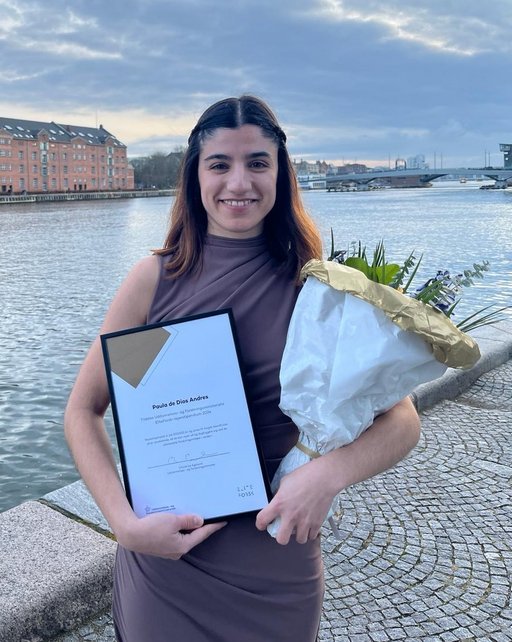PhD student from iNANO receives Elite Research Travel Grant
Paula de Dios Andres from the Interdisciplinary Nanoscience Center (iNANO) has been awarded an Elite Research Travel Grant, which allows her to spend a long-term stay at University Michigan.
Mention based on press release from the Ministry of Higher Education and Science.
What is the focus of your PhD project?
My PhD project focuses on creating liver-like tissue from scratch as an alternative to a natural liver that can be used for both clinical applications and disease modelling in the laboratory. The liver-like tissue is semi-synthetic (bionic) and is made from a material consisting of a hydrogel with both natural and artificial liver cells. The semi-synthetic tissue is built using 3D bioprinting, which prints living cells together with gel-based materials. In simple terms, it glues the cells together to create a geometrically well-defined structure. The purpose of incorporating artificial cells is to mimic selected structural and functional properties of mammalian cells so that they can support, augment, or replace aspects of their living role models. In this way, the semi-synthetic tissue will have designed properties that cannot be achieved exclusively with the natural mammalian cells.
What is the most exciting thing about your field of research?
One of the aims of synthetic biology research is to utilise tools from chemistry, biology, nano and materials science to create artificial cells. Devices with single or multiple cellular functions are designed and integrated by assembling artificial cells with the ultimate goal of mimicking their natural counterparts. There are many exciting aspects to this area of research. I personally find the most fascinating is the potential of integrating artificial cells with mammalian cells and tissues that can act as a type of prosthesis that supports, augments or replaces the function of the natural cells.
What does your project contribute to the research field and society?
There is a great need for alternatives to natural organs and tissues in the clinic, as there is a limited supply of natural organs, e.g. for transplants. Therefore, my PhD explores how semi-synthetic tissues - and ultimately biosynthetic livers - can be developed as an alternative to natural liver tissue. These can be used when a liver transplant is not available, for example in the form of devices outside the body that can stabilise patients until a liver transplant is available. By creating semi-synthetic tissue that consists of both natural and artificial liver cells, the need for natural cells and tissue is minimised. In addition, the artificial cells can be used to support different types of natural liver cells in performing their function. The project also contributes to the basic research on artificial cells in synthetic biology and how we can better design them to function in a biological context.
What does an Elite Research Travel Grant mean for your future opportunities?
My Elite Research Travel Grant will be used to travel to the University of Michigan (USA), where I will collaborate with Associate Professor Allen Liu, whose research group is working on building cell-like systems that mimic mechanical and biochemical aspects of a cell. The residency will give me a lot of new experience in bottom-up synthetic biology, specifically in terms of how we can better design artificial cells to more fully mimic natural mammalian cells in terms of the cellular 'skeleton' - as artificial cells are currently very minimal compared to their natural role models. This experience will be essential for developing the next generation of synthetic cells.
A little about the person behind the researcher
I was born and raised in Leon, a small town in northern Spain. After high school, I moved to Zaragoza where I studied chemistry. After my bachelor's degree, I decided to venture into the unknown and moved to Aarhus to continue my studies. Today, I spend a lot of my time doing research related to my PhD project. My free time is often spent travelling or spending time with friends and family. I love travelling and grab every chance I get, and whenever possible, I drag my parents and sister with me to discover new places.
About Elite Research Travel Grants
A total of 18 Elite Research Travel Grants of DKK 200,000 each are awarded to PhD students who have achieved great results early in their career. The scholarships are earmarked for stays abroad, where PhD students can visit some of the best research institutions in the world to improve their skills in their field.

